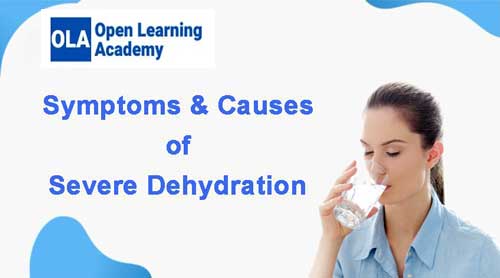Are willing to know the symptoms and causes of severe dehydration in children and adults? If so, this blog post is for you.
Many people suffer from dehydration, which can be severe and sometimes dangerous. In this blog post, we will answer the following questions: What are the symptoms of severe dehydration? what are the reasons for its occurrence?
Dehydration is a health condition that has serious consequences if not treated in time and in the right way. Here are the symptoms of severe dehydration in adults and children, and the most prominent causes of its occurrence:
Symptoms of Severe Dehydration
Dehydration occurs when body fluids are lost without adequate compensation, which leads to a person feeling a number of symptoms, most notably feeling very thirsty, dry mouth, decreased sweating and urination.
However, in some cases of severe dehydration, more serious and severe symptoms may occur.
Symptoms of Severe Dehydration in Adults
The following are symptoms of severe dehydration in adults:
- Decreased feeling of thirst.
- Dehydration leads to decreased fluid throughout the body, including the blood, which results in lower blood pressure, rapid heart rate, and respiratory rate.
- Feeling tired and sleeping for long periods.
- Dizziness, particularly when standing, due to low blood pressure.
- Less frequent urination, dark yellow urine.
- Hypovolemic shock due to dehydration that may damage body organs such as the liver, kidneys, liver, and brain.
- Severe dehydration can harm brain cells, causing confusion and mental confusion.
- Fainting and falling into a coma, especially in severe cases
Symptoms of Severe Dehydration in Children
Young children and infants are more prone to dehydration, and their health deteriorates quickly. Because the fluids they normally lose from diarrhea and vomiting make up a large percentage of total body fluids.
If mild and moderate cases of dehydration are not treated, the child's health condition may worsen, and the child will be severely dehydrated.
The following are the most prominent symptoms of severe dehydration in children and infants:
- The appearance of sunken eyes, dry mouth, and reduced skin in the fontanel area on the child’s head so that it appears in a sunken view, in addition to dryness and loss of the skin. of its flexibility.
- Baby crying without tears.
- A marked decrease in the amount of urine the baby produces, so that the nappy remains dry for 3 hours or more.
- Notice the child's lethargy and his unwillingness to play, move or sleep for long periods, and reduce his alertness and attention.
- Decreased blood volume, which leads to a decrease in pressure in the child, the occurrence of an acceleration of the child's heartbeat, but the pulse is weak.
- The baby's skin appears bluish and the extremities are cold as a result of low pressure and poor blood oxygen delivery.
- Increase the child's breathing rate.
- Child's stomach bloating.
- Huge muscle spasm.
- The child is subject to epileptic seizures and may go into a coma.
In cases of dehydration in children, a doctor should be consulted immediately to provide the appropriate treatment for the child and to avoid the occurrence of serious health complications that may kill the child.
How is Dehydration Diagnosed?
In diagnosing dehydration and its severity, the doctor relies on a number of factors and tests, the most important of which are:
- The signs that appear on the patient's body in addition to the symptoms of which he complains.
- Physical examination and checking of vital signs in the body such as: blood pressure, rapid heart rate, cyanosis, and cold extremities.
- A blood test to determine the percentage of some elements whose presence in the body is impaired in dehydration, such as sodium and potassium, and a check of kidney function.
- Performing a urine analysis (urinalysis) on the patient to determine the cause and degree of dehydration.
Causes of Severe Dehydration
Dehydration can occur for a variety of reasons, but it is more common in the elderly and infant populations.
The following are the primary causes of severe dehydration in the body:
- In these cases, diarrhea and vomiting, as well as a high body temperature, are the main causes of dehydration due to a large amount of fluid lost.
- Staying in hot and humid climates, where the heat and humidity increase the amount of fluid lost through sweating.
- Exercising for an extended period of time without compensating for the deficiency caused by sweating, especially if you exercise outside in hot weather.
- A significant increase in the number of urination times, which usually occurs as a result of taking certain medications, such as diuretics, or as a result of a person suffering from chronic diseases caused by high blood sugar levels, such as diabetes.
- Exposure to burns may result in significant fluid loss, especially if the burns occurred over a large area of the body.


